3 sept 2014
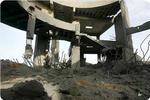
The education sector's losses in Gaza are estimated at $22 million due to the Israeli aggression, Palestinian Economic Council for Development and Reconstruction (PECDAR) revealed. Head of PECDAR’s Gaza branch Mohamed Najar confirmed in a press release on Tuesday that 142 schools were damaged during Israeli aggression on the Strip including 23 schools were totally destroyed.
The 23 destroyed schools reconstruction cost estimates stand at $8 million, while the 119 partially damaged schools reconstruction cost is estimated at $4 million, he added.
Gaza’s higher education sector reconstruction cost estimates hit $10 million after the total and partial destruction of three universities in the Strip during the Israeli offensive. Hundreds of university students will be deprived from completing their education this year.
PECDAR report warned that Gaza’s students would face major difficulties during the current school year due to the destruction of dozens of schools in addition to the overcrowded classrooms that forces the Education Ministry to adopt the 2-class period system per day.
The report recommended adopting 3-class period system in order to overcome the overcrowding as a temporary solution till the reconstruction of the damaged schools.
PECDAR also called for accelerating the reconstruction of the partially damaged schools and to allow the immediate entry of construction materials into the Strip.
The 23 destroyed schools reconstruction cost estimates stand at $8 million, while the 119 partially damaged schools reconstruction cost is estimated at $4 million, he added.
Gaza’s higher education sector reconstruction cost estimates hit $10 million after the total and partial destruction of three universities in the Strip during the Israeli offensive. Hundreds of university students will be deprived from completing their education this year.
PECDAR report warned that Gaza’s students would face major difficulties during the current school year due to the destruction of dozens of schools in addition to the overcrowded classrooms that forces the Education Ministry to adopt the 2-class period system per day.
The report recommended adopting 3-class period system in order to overcome the overcrowding as a temporary solution till the reconstruction of the damaged schools.
PECDAR also called for accelerating the reconstruction of the partially damaged schools and to allow the immediate entry of construction materials into the Strip.

Israel’s failure to decipher the mystery of the two captured Israeli soldiers in the wake of the Gaza offensive, has turned into the most nightmarish of all of mazes, Al-Majd security website said. Hamas claimed responsibility for the capturing of an Israeli occupation soldier, identified as Shaul Aarun, and refused to release any further details as long as nothing is to be gained from Israel.
According to Al-Majd security website, the Israeli intelligence apparatuses will step up their search operations in an attempt to decode the cryptograms of the enigma by all means.
Intimidating text messages, money blackmailing, anti-resistance leaflets, smear campaigns, ad hominem moves, online and field collaborators along with spying equipment and personnel, are among the tactics to be used by the Israeli occupation throughout the large-scale operation search as it already did, and failed, in 2006 in its vain hunt for ex-captive Gilad Shalit.
According to Al-Majd security website, the Israeli intelligence apparatuses will step up their search operations in an attempt to decode the cryptograms of the enigma by all means.
Intimidating text messages, money blackmailing, anti-resistance leaflets, smear campaigns, ad hominem moves, online and field collaborators along with spying equipment and personnel, are among the tactics to be used by the Israeli occupation throughout the large-scale operation search as it already did, and failed, in 2006 in its vain hunt for ex-captive Gilad Shalit.
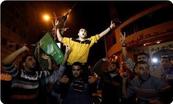
Israel’s failure to divide, disarm or defeat the heroic resistance in Gaza is seen as a historic political victory, Columnist Sara Flounders wrote in an article published by The American Workers World newspaper on Tuesday. The article, entitled “Gaza – political victory for Palestine,” reported: “Israel caused massive destruction in Gaza and killed, according to a United Nations report, 2,104 people, including 1,462 civilians of whom 495 were children.”
“The attacks further destroyed essential infrastructure, water, electricity, schools, medical centers and almost one-third of the housing. This devastation has created international outrage. Many in Israel view the war as a devastating political setback,” the report went.
According to Sara Flounders, the seven-week military onslaught utterly failed in its objectives of defeating the elected Hamas government and dividing the new Palestinian unity government of Hamas and Fatah. All Palestinian political forces took part in the resistance, coordinating their defensive actions.
“The Palestinians’ greatest accomplishment was to prevent the high-tech, heavily armed Israeli Defense Forces from accomplishing its goal of disarming a determined Palestinian resistance, which used hundreds of tunnels, simple rockets and smuggled, hand-held weapons,” Flounders wrote.
In Founders’ terms, rallies in Gaza, in the Israeli-occupied West Bank and by thousands of Palestinians living within Israel’s 1967 boundaries make it clear that the Palestinians believe they won.
“Thousands of Palestinians celebrated in streets of Gaza City on Aug. 27. Deputy Head of the Hamas Politburo, Ismail Haniyeh, and other resistance leaders joined the public celebration. Haniyeh explained that the resistance had been preparing for the battle for years: “The victory is beyond the limits of time and place. This battle is a war that lacks a precedent in the history of conflict with the enemy,” she added.
“Hamas spokesman Abu Ubaida told a large crowd gathered in Gaza City’s eastern Shujaiyya neighborhood — devastated during Israel’s ground assault: ‘Resistance unified the people, and that is our big achievement. We will not return to divisions or disputes,’ Flounders wrote down.
“There is still no signed agreement. Israel’s primary demand — the disarmament of Gaza’s resistance organizations — is not even open for discussion,” she added in a section of the article dubbed “A ceasefire — no agreement”
In the writer’s view, Israel always violated both signed ceasefire agreements and agreements to open the border. Israel has violated all other agreements made with the Palestinians, including the 1993 Oslo Accords.
Flounders further pointed to the Gaza victory rally of more than 2,000 people held on August 28 in Galilee, within Israel’s 1948 borders, where marchers waved Palestinian flags and held pictures of slain children in Gaza.
The columnist referred to Palestinian elected Knesset (parliament) member, Hanin Zoabi, who said during the rally: “The Palestinian resistance and the people as a whole in Gaza defeated all the military and political objectives that Israel set for itself. Our people’s struggle thwarted all of Israel’s objectives.”
In an outspoken reference to Israel’s defeat, outlined in a section of the critique entitled “Zionists’ great fear: Israel has lost”, the writer called Israeli premier Netanyahu a “war criminal” who “hollowly proclaimed victory” and pretended that Israel had secured both a great military achievement and a political achievement.
“But the Zionist establishment now fears that the war was a howling blunder,” Sara Flounders wonders.
Flounders quoted Amir Oren of Haaretz, a major Israeli publication, in a stunning admission of how much Israel has been set back: “What Netanyahu and his colleagues have brought down on Israel, in a conflict between the region’s strongest army and an organization numbering 10,000, is not just a defeat. It’s a downfall.”
On July 23, Israeli polls claimed 82 percent of Israelis approved of Netanyahu’s leadership. On Aug. 28 the Jerusalem Post says his support is down to 38 percent and falling further, she explained.
According to Flounders, the Israeli military suffered its highest casualty rate since it attempted to invade Lebanon in 2006. This time, the Palestinian resistance was able to carry out cross-border raids and target military sites in addition to firing small rockets into Jerusalem, Tel Aviv and Haifa. This has given new confidence to the desperate Gaza population, which has lived decades under a brutal occupation.
The writer referred to the evaluation of Ali Abunimah of Electronic Intifada who wrote: “Israel lost! If ‘victory’ is measured in the number of civilians an army kills and injures, or the number of homes, hospitals, mosques or schools it destroys, Israel is the clear champion once again."
“The attacks further destroyed essential infrastructure, water, electricity, schools, medical centers and almost one-third of the housing. This devastation has created international outrage. Many in Israel view the war as a devastating political setback,” the report went.
According to Sara Flounders, the seven-week military onslaught utterly failed in its objectives of defeating the elected Hamas government and dividing the new Palestinian unity government of Hamas and Fatah. All Palestinian political forces took part in the resistance, coordinating their defensive actions.
“The Palestinians’ greatest accomplishment was to prevent the high-tech, heavily armed Israeli Defense Forces from accomplishing its goal of disarming a determined Palestinian resistance, which used hundreds of tunnels, simple rockets and smuggled, hand-held weapons,” Flounders wrote.
In Founders’ terms, rallies in Gaza, in the Israeli-occupied West Bank and by thousands of Palestinians living within Israel’s 1967 boundaries make it clear that the Palestinians believe they won.
“Thousands of Palestinians celebrated in streets of Gaza City on Aug. 27. Deputy Head of the Hamas Politburo, Ismail Haniyeh, and other resistance leaders joined the public celebration. Haniyeh explained that the resistance had been preparing for the battle for years: “The victory is beyond the limits of time and place. This battle is a war that lacks a precedent in the history of conflict with the enemy,” she added.
“Hamas spokesman Abu Ubaida told a large crowd gathered in Gaza City’s eastern Shujaiyya neighborhood — devastated during Israel’s ground assault: ‘Resistance unified the people, and that is our big achievement. We will not return to divisions or disputes,’ Flounders wrote down.
“There is still no signed agreement. Israel’s primary demand — the disarmament of Gaza’s resistance organizations — is not even open for discussion,” she added in a section of the article dubbed “A ceasefire — no agreement”
In the writer’s view, Israel always violated both signed ceasefire agreements and agreements to open the border. Israel has violated all other agreements made with the Palestinians, including the 1993 Oslo Accords.
Flounders further pointed to the Gaza victory rally of more than 2,000 people held on August 28 in Galilee, within Israel’s 1948 borders, where marchers waved Palestinian flags and held pictures of slain children in Gaza.
The columnist referred to Palestinian elected Knesset (parliament) member, Hanin Zoabi, who said during the rally: “The Palestinian resistance and the people as a whole in Gaza defeated all the military and political objectives that Israel set for itself. Our people’s struggle thwarted all of Israel’s objectives.”
In an outspoken reference to Israel’s defeat, outlined in a section of the critique entitled “Zionists’ great fear: Israel has lost”, the writer called Israeli premier Netanyahu a “war criminal” who “hollowly proclaimed victory” and pretended that Israel had secured both a great military achievement and a political achievement.
“But the Zionist establishment now fears that the war was a howling blunder,” Sara Flounders wonders.
Flounders quoted Amir Oren of Haaretz, a major Israeli publication, in a stunning admission of how much Israel has been set back: “What Netanyahu and his colleagues have brought down on Israel, in a conflict between the region’s strongest army and an organization numbering 10,000, is not just a defeat. It’s a downfall.”
On July 23, Israeli polls claimed 82 percent of Israelis approved of Netanyahu’s leadership. On Aug. 28 the Jerusalem Post says his support is down to 38 percent and falling further, she explained.
According to Flounders, the Israeli military suffered its highest casualty rate since it attempted to invade Lebanon in 2006. This time, the Palestinian resistance was able to carry out cross-border raids and target military sites in addition to firing small rockets into Jerusalem, Tel Aviv and Haifa. This has given new confidence to the desperate Gaza population, which has lived decades under a brutal occupation.
The writer referred to the evaluation of Ali Abunimah of Electronic Intifada who wrote: “Israel lost! If ‘victory’ is measured in the number of civilians an army kills and injures, or the number of homes, hospitals, mosques or schools it destroys, Israel is the clear champion once again."

Turkey has initiated contacts with various parties to deliver a Turkish floating power-generating ship to the Gaza Strip so as to relieve the power crisis rocking the beleaguered Palestinian enclave, Turkish Consul-General in Jerusalem Mustafa Sarnic said Tuesday. "Gaza's electricity network has been badly damaged and we are ready to offer help in this regard," Anadolu Agency quoted Sarnic as telling reporters in his residence in East Jerusalem.
"Turkish Energy Minister Taner Yildiz suggested sending a floating power-generating ship to Gaza to provide the enclave with electricity for a definite period until the crisis is over," he added.
The Turkish diplomat pointed out that “the Palestinian Energy minister met with Turkish officials in Istanbul and Ankara for talks held towards that end. If an agreement is reached, the ship would provide 80-100 megawatts for Gaza."
“Turkey is set to send 1,000 mobile homes worth $5 million to give shelter to those who had their houses destroyed during the Israeli war,” he further declared.
“Since the early moments of the Israeli offensive on Gaza Turkey has made sure to stand by Palestinians in the besieged Strip,” he stated, adding: "The Turkish government and people immediately stood by the Palestinians. We did our best and are ready to do more.”
He pointed to the 84 Palestinian casualties transferred to Turkey to receive urgent treatment and surgeries due to the critical wounds they sustained in the Gaza offensive, vowing, “Turkey is ready to heal the wounds of other Palestinian war victims whenever considered necessary”.
"Turkish Energy Minister Taner Yildiz suggested sending a floating power-generating ship to Gaza to provide the enclave with electricity for a definite period until the crisis is over," he added.
The Turkish diplomat pointed out that “the Palestinian Energy minister met with Turkish officials in Istanbul and Ankara for talks held towards that end. If an agreement is reached, the ship would provide 80-100 megawatts for Gaza."
“Turkey is set to send 1,000 mobile homes worth $5 million to give shelter to those who had their houses destroyed during the Israeli war,” he further declared.
“Since the early moments of the Israeli offensive on Gaza Turkey has made sure to stand by Palestinians in the besieged Strip,” he stated, adding: "The Turkish government and people immediately stood by the Palestinians. We did our best and are ready to do more.”
He pointed to the 84 Palestinian casualties transferred to Turkey to receive urgent treatment and surgeries due to the critical wounds they sustained in the Gaza offensive, vowing, “Turkey is ready to heal the wounds of other Palestinian war victims whenever considered necessary”.
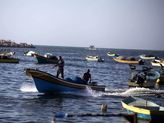
Israeli soldiers opened fire, on Wednesday morning, at a number of Palestinian fishing boats close to the shore in the Sudaniyya area, west of Gaza City, and kidnapped two.
Eyewitnesses said that Israeli navy boats opened fire at random, before attacking the fishing boats, and kidnapped two fishermen identified as Mohammad Zayed and Mousa Sultan.
On Monday, at dawn, soldiers also attacked a number of Palestinian fishing boats, close to the shore, in Rafah, in the southern part of the Gaza Strip.
The ongoing attacks come in direct violations of the Egyptian-mediated cease-fire agreement on August 26, ending Israel’s war on Gaza that started on July 8.
At least 2137 Palestinians, including 577 children, 263 women, and 102 elderly have been killed, and more than 11100, including 3374 children, 2088 women and 410 elderly, have been injured.
The attacks are also a violation of every cease-fire deal mediated between Israel and the resistance in Gaza, including the Israeli offensives on Gaza in 2012 and 2008.
On Tuesday, Israeli warships opened fire at Palestinian fishermen in Gaza territorial waters.
The August 26 agreement stipulated that Israel would immediately expand the fishing zone off Gaza's coast to six nautical miles, and would continue to expand over time.
According to the deal, they would be allowed to sail out as far as nine nautical miles, a week from the cease-fire date, and as far as twelve, a month from then.
Under the Oslo Agreements, the Palestinians are supposed to be allowed to fish within 20 nautical miles, but the Israeli navy kept attacking them, and their boats, even while docked at the shore, causing dozens of casualties, arrests, and destruction of shipping boats.
Eyewitnesses said that Israeli navy boats opened fire at random, before attacking the fishing boats, and kidnapped two fishermen identified as Mohammad Zayed and Mousa Sultan.
On Monday, at dawn, soldiers also attacked a number of Palestinian fishing boats, close to the shore, in Rafah, in the southern part of the Gaza Strip.
The ongoing attacks come in direct violations of the Egyptian-mediated cease-fire agreement on August 26, ending Israel’s war on Gaza that started on July 8.
At least 2137 Palestinians, including 577 children, 263 women, and 102 elderly have been killed, and more than 11100, including 3374 children, 2088 women and 410 elderly, have been injured.
The attacks are also a violation of every cease-fire deal mediated between Israel and the resistance in Gaza, including the Israeli offensives on Gaza in 2012 and 2008.
On Tuesday, Israeli warships opened fire at Palestinian fishermen in Gaza territorial waters.
The August 26 agreement stipulated that Israel would immediately expand the fishing zone off Gaza's coast to six nautical miles, and would continue to expand over time.
According to the deal, they would be allowed to sail out as far as nine nautical miles, a week from the cease-fire date, and as far as twelve, a month from then.
Under the Oslo Agreements, the Palestinians are supposed to be allowed to fish within 20 nautical miles, but the Israeli navy kept attacking them, and their boats, even while docked at the shore, causing dozens of casualties, arrests, and destruction of shipping boats.
2 sept 2014

Chairman of the Palestinians in Europe Conference, Majed al-Zeer, among many other analysts, detected a significant shift in the overall European temperament regarding the Palestinian cause in the wake of the latest Israeli offensive on besieged Gaza. Talking to al-Jazeera “In Depth” TV show on Monday, al-Zeer dubbed the Israeli offensive on Gaza “a real coup” that has deeply reshaped the European-Israeli ties and dealt a blow to both the public and official pro-Israel positions.
Al-Zeer, serving also as General Director of the London-based Palestinian Return Center, said the typically pejorative European impression regarding the Israeli occupation has not occurred out of the blue. Such shifts have been rather gradual, forever shaped and reshaped by the atrocious 1982 Sabra and Shatila massacre, the Uprising of Stones, and al-Aqsa Intifada and have transfigured most decisively in the recent offensive on the Gaza Strip.
Al-Zeer attributed the entrancement of such anti-Israel stance to the vital role played by the European pro-Palestine organizations each of which has been striving to raise awareness of the Palestinian cause and promote Palestinians’ fair demands.
A true-to-life diffusion of Israeli crimes against Gaza children throughout Western media outlets and social networking websites was authentic enough to stir up the sympathy of the European masses as opposed to a remarkable antagonism regarding the Israeli invader, he explained.
According to Al-Zeer, the fact that a British minister stepped down and that Spain banned restocking Israel with arms are enough proofs of the clear-out international discomfiture with pro-Israel policies.
Jewish writer and activist Bail Lehrer went through a similar line of reasoning when she said sympathy with Israel went into a nosedive due to public pressure, basically.
“Israeli premier Netanyahu would only halt his war under American and European command, itself progeny of public pressure,” she wrote.
Lehrer further attributed the shift to a set of ethical motives denouncing the perpetration of Zionist violence against civilians and children since 1948.
Head of the Palestine Solidarity Campaign in Britain, Hugh Lanning, said pro-Palestine positions have risen by 10%.
The bulk of contemporary historians agree that the Palestinian narrative has reaped the strongest and most authentic of all impacts, with a good majority among the Western audience gradually reckoning the inherently biased and two-faced nature of the Israeli version broadcast on pro-Israel media and TV channels.
This is an “uprising of solidarity” with Palestine and its oppressed people al-Zeer declared as he paid homage to the pro-Palestine media, resistance, public support, truce delegation, who have all, each in their own way, demonstrated to the world who Israelis really are - a bunch of criminals to whom neither age, nor sex, nor human ethics seem to have really made a difference.
Al-Zeer, serving also as General Director of the London-based Palestinian Return Center, said the typically pejorative European impression regarding the Israeli occupation has not occurred out of the blue. Such shifts have been rather gradual, forever shaped and reshaped by the atrocious 1982 Sabra and Shatila massacre, the Uprising of Stones, and al-Aqsa Intifada and have transfigured most decisively in the recent offensive on the Gaza Strip.
Al-Zeer attributed the entrancement of such anti-Israel stance to the vital role played by the European pro-Palestine organizations each of which has been striving to raise awareness of the Palestinian cause and promote Palestinians’ fair demands.
A true-to-life diffusion of Israeli crimes against Gaza children throughout Western media outlets and social networking websites was authentic enough to stir up the sympathy of the European masses as opposed to a remarkable antagonism regarding the Israeli invader, he explained.
According to Al-Zeer, the fact that a British minister stepped down and that Spain banned restocking Israel with arms are enough proofs of the clear-out international discomfiture with pro-Israel policies.
Jewish writer and activist Bail Lehrer went through a similar line of reasoning when she said sympathy with Israel went into a nosedive due to public pressure, basically.
“Israeli premier Netanyahu would only halt his war under American and European command, itself progeny of public pressure,” she wrote.
Lehrer further attributed the shift to a set of ethical motives denouncing the perpetration of Zionist violence against civilians and children since 1948.
Head of the Palestine Solidarity Campaign in Britain, Hugh Lanning, said pro-Palestine positions have risen by 10%.
The bulk of contemporary historians agree that the Palestinian narrative has reaped the strongest and most authentic of all impacts, with a good majority among the Western audience gradually reckoning the inherently biased and two-faced nature of the Israeli version broadcast on pro-Israel media and TV channels.
This is an “uprising of solidarity” with Palestine and its oppressed people al-Zeer declared as he paid homage to the pro-Palestine media, resistance, public support, truce delegation, who have all, each in their own way, demonstrated to the world who Israelis really are - a bunch of criminals to whom neither age, nor sex, nor human ethics seem to have really made a difference.

The new Turkish government said it would not restore its relations with Israel to normal if it did not put an end to its violations against the Palestinians and its blockade on the population in the Gaza Strip. Ahmet Davutoglu, Turkey's new premier, stated in a speech to the parliament on Monday that achieving progress in the relations with Israel would be impossible unless Israel decided to end its violations against the Palestinian people and lift its restrictions on them, especially the blockade on Gaza.
Davutoglu stressed that the new Turkey would strengthen its integration with the world and pursue an effective foreign policy that observes human rights and respects dialog.
Davutoglu stressed that the new Turkey would strengthen its integration with the world and pursue an effective foreign policy that observes human rights and respects dialog.
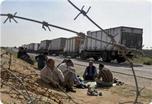
Haaretz Hebrew newspaper stated that lifting the siege on Gaza and opening all the border crossings would achieve a permanent ceasefire and a durable peace in Gaza Strip especially that "it is proven that the blockade merely foments violence." The newspaper addressed, in its report titled “There's no whitewashing the Gaza blockade” on Monday, the 8-year Israeli siege on Gaza Strip. “The Gaza Strip doesn’t need generosity or favors. Netanyahu must end the blockade; fully open the crossings between Gaza and Israel.”
Haaretz quoted a senior military officer as saying that it is in Israel’s interest to avoid intense social and economic pressure on Gaza.
According to the newspaper, this statement raises three questions: Why did the defense establishment remember to examine the ramifications of the Gaza blockade on its residents only after the war? Why is the Israeli army suggesting that the politicians ease the blockade, instead of the politicians initiating this crucial step on their own? And what is the practical meaning of this generosity?
Haaretz considered that even this positive suggestion, if adopted, cannot whitewash the perverse blockade. “Easing its terms alone, as we’ve seen in the past, doesn’t create conditions for normal life, doesn’t offer any economic or diplomatic horizon, and at best serves as insufficient cover for the government’s claim that it has no dispute with the people of Gaza, but only with Hamas.”
“Moreover, the version of relief the IDF is suggesting has in the past been no more than symbolic gestures, like allowing in equipment to finish building a new hospital in Gaza, or worse, took the form of an inhumane calculation of how many calories each resident needed, which was used to derive what products would be allowed into the Strip.”
The Gaza Strip, with its 1.8 million people, according to the newspaper, doesn’t need generosity or favors. Prime Minister Benjamin Netanyahu, who speaks vaguely of a “diplomatic horizon,” must end the blockade, fully open the crossings between Gaza and Israel and give a real chance for development to bring quiet, after it has been proven that the blockade merely foments violent rebellions against Israel.
The Israeli newspaper concluded by saying that “this doesn’t mean that Israel must give up the close inspection of the goods that enter or leave the Strip. But there is a big difference between security checks and even a minimum security prison. Israel has the power to close that gap and work on behalf of its mutual interests with the residents of Gaza.”
Haaretz quoted a senior military officer as saying that it is in Israel’s interest to avoid intense social and economic pressure on Gaza.
According to the newspaper, this statement raises three questions: Why did the defense establishment remember to examine the ramifications of the Gaza blockade on its residents only after the war? Why is the Israeli army suggesting that the politicians ease the blockade, instead of the politicians initiating this crucial step on their own? And what is the practical meaning of this generosity?
Haaretz considered that even this positive suggestion, if adopted, cannot whitewash the perverse blockade. “Easing its terms alone, as we’ve seen in the past, doesn’t create conditions for normal life, doesn’t offer any economic or diplomatic horizon, and at best serves as insufficient cover for the government’s claim that it has no dispute with the people of Gaza, but only with Hamas.”
“Moreover, the version of relief the IDF is suggesting has in the past been no more than symbolic gestures, like allowing in equipment to finish building a new hospital in Gaza, or worse, took the form of an inhumane calculation of how many calories each resident needed, which was used to derive what products would be allowed into the Strip.”
The Gaza Strip, with its 1.8 million people, according to the newspaper, doesn’t need generosity or favors. Prime Minister Benjamin Netanyahu, who speaks vaguely of a “diplomatic horizon,” must end the blockade, fully open the crossings between Gaza and Israel and give a real chance for development to bring quiet, after it has been proven that the blockade merely foments violent rebellions against Israel.
The Israeli newspaper concluded by saying that “this doesn’t mean that Israel must give up the close inspection of the goods that enter or leave the Strip. But there is a big difference between security checks and even a minimum security prison. Israel has the power to close that gap and work on behalf of its mutual interests with the residents of Gaza.”
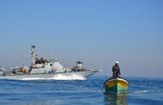
Israeli forces have opened fire at fishermen off the coast of Rafah, in the southern Gaza Strip, in an apparent violation of the ceasefire agreement reached in Cairo last week, according to fishermen.
Palestinian fishermen told Ma'an News Agency that Israeli warships fired at their boats with machine guns, while they were sailing within the agreed-upon six-nautical-mile limit, near Rafah. No injuries were reported.
An Israeli army spokeswoman said fishermen "deviated from the designated fishing zone," and that "warning shots" were fired into the air.
Asked how far the fishermen were sailing from shore, the spokeswoman claimed she did not know the exact distance, but that it was further than six nautical miles.
Prior the recent agreement, Israel maintained a limit of three nautical miles off shore for Gaza fishermen, and opened fire at any who strayed further, despite earlier agreements which had actually settled on a 20-mile limit.
The restrictions crippled Gaza's fishing industry and impoverished those dependent upon it.
The ceasefire agreement reached on Aug. 26 stipulated that Israel would immediately expand the fishing zone off Gaza's coast to six nautical miles, and would continue to expand over time. According to the deal, they would be allowed to sail out as far as nine nautical miles, a week from the ceasefire date, and as far as twelve, a month from then.
See: "Gaza Officials: Ceasefire Terms Being Implemented"
Under the terms of the deal, Israel also reportedly agreed to ease the ongoing siege on the region.
However, according to Israeli media, PM Benjamin Netanyahu does not even intend to send a delegation for negotiations in Cairo, as stipulated by the recent ceasefire agreement.
Palestinian fishermen told Ma'an News Agency that Israeli warships fired at their boats with machine guns, while they were sailing within the agreed-upon six-nautical-mile limit, near Rafah. No injuries were reported.
An Israeli army spokeswoman said fishermen "deviated from the designated fishing zone," and that "warning shots" were fired into the air.
Asked how far the fishermen were sailing from shore, the spokeswoman claimed she did not know the exact distance, but that it was further than six nautical miles.
Prior the recent agreement, Israel maintained a limit of three nautical miles off shore for Gaza fishermen, and opened fire at any who strayed further, despite earlier agreements which had actually settled on a 20-mile limit.
The restrictions crippled Gaza's fishing industry and impoverished those dependent upon it.
The ceasefire agreement reached on Aug. 26 stipulated that Israel would immediately expand the fishing zone off Gaza's coast to six nautical miles, and would continue to expand over time. According to the deal, they would be allowed to sail out as far as nine nautical miles, a week from the ceasefire date, and as far as twelve, a month from then.
See: "Gaza Officials: Ceasefire Terms Being Implemented"
Under the terms of the deal, Israel also reportedly agreed to ease the ongoing siege on the region.
However, according to Israeli media, PM Benjamin Netanyahu does not even intend to send a delegation for negotiations in Cairo, as stipulated by the recent ceasefire agreement.

A Palestinian man early Tuesday succumbed to wounds sustained during Israel's offensive on Gaza, family members told Ma'an.
Basim Ajjur, 55, died in a hospital in Jerusalem, bringing the death toll from the Israeli assault to 2,159.
Ajjur was transferred to the hospital after being critically injured approximately two weeks ago, when an Israeli airstrike hit his home near the al-Zahra school in central Gaza City, a relative told Ma'an.
His 20-year-old son Saad was killed in the same airstrike, which injured a number of Palestinians from the same family.
At least six Palestinians have died of their wounds since the announcement of a long-term ceasefire in Gaza on Aug. 26. Over 11,000 Palestinians sustained injuries in Israeli attacks throughout the seven-week assault.
Basim Ajjur, 55, died in a hospital in Jerusalem, bringing the death toll from the Israeli assault to 2,159.
Ajjur was transferred to the hospital after being critically injured approximately two weeks ago, when an Israeli airstrike hit his home near the al-Zahra school in central Gaza City, a relative told Ma'an.
His 20-year-old son Saad was killed in the same airstrike, which injured a number of Palestinians from the same family.
At least six Palestinians have died of their wounds since the announcement of a long-term ceasefire in Gaza on Aug. 26. Over 11,000 Palestinians sustained injuries in Israeli attacks throughout the seven-week assault.

A Palestinian died Wednesday of injuries sustained during the Israeli assault on the Gaza Strip over the last two months.
Medical sources said Nasir Abu Marahil, 40, passed away in a Jerusalem hospital as a result of injuries he sustained in al-Nusairat refugee camp on July 25.
Gaza medical authorities said the death toll in Gaza had risen to 2,152 as a result of the Israeli offensive.
The offensive lasted more than 50 days and left more than 11,000 injured, as well as more than 100,000 Gazans homeless.
Despite the high death toll in Gaza, many Palestinians hailed the ceasefire that brought the end of the offensive as a major victory for Palestinians.
Israel promised the easing of the eight-year long siege on the besieged coastal enclave while Palestinians offered no concessions in return.
Since then, however, watchdogs say Israeli authorities have failed to act on their promise, although a new round of negotiations is supposed to be held in September.
Medical sources said Nasir Abu Marahil, 40, passed away in a Jerusalem hospital as a result of injuries he sustained in al-Nusairat refugee camp on July 25.
Gaza medical authorities said the death toll in Gaza had risen to 2,152 as a result of the Israeli offensive.
The offensive lasted more than 50 days and left more than 11,000 injured, as well as more than 100,000 Gazans homeless.
Despite the high death toll in Gaza, many Palestinians hailed the ceasefire that brought the end of the offensive as a major victory for Palestinians.
Israel promised the easing of the eight-year long siege on the besieged coastal enclave while Palestinians offered no concessions in return.
Since then, however, watchdogs say Israeli authorities have failed to act on their promise, although a new round of negotiations is supposed to be held in September.
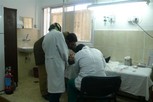
A nine-year-old boy died in Gaza on Monday from wounds sustained during Israel's recent offensive on the besieged enclave, medics said.
Ziad al-Rifi was injured on Aug. 21 in an Israeli airstrike near his family home in Gaza City which killed Tariq al-Rifi, 35, his sons Omar and Muhammad, and seven-year-old Abdullah Tariq al-Rifi.
The victims were watering trees in fields the family owned when they were targeted by two missiles.
Al-Rifi's death brought the total death during Israel's offensive to 2,158 Palestinians.
Ziad al-Rifi was injured on Aug. 21 in an Israeli airstrike near his family home in Gaza City which killed Tariq al-Rifi, 35, his sons Omar and Muhammad, and seven-year-old Abdullah Tariq al-Rifi.
The victims were watering trees in fields the family owned when they were targeted by two missiles.
Al-Rifi's death brought the total death during Israel's offensive to 2,158 Palestinians.
28 aug 2014
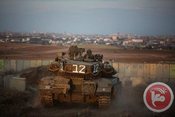
Israeli forces fired warning shots near the northern Gaza Strip on Thursday, Israel's army said.
An Israeli army spokeswoman said warning shots were fired in the air after a crowd of Palestinians began hurling rocks at the security fence.
The crowd dispersed following the gunfire, she added.
The incident took place east of Gaza City in an area adjacent to the Nahal Oz kibbutz, Israeli media reported.
The Israeli security buffer zone around Gaza was meant to be reduced following Tuesday's ceasefire agreement, with farmers initially reporting that they were able to access their fields 100 meters from the border fence.
Before Operation Protective Edge, Israeli forces routinely opened fire on those who entered the buffer zone, which ranged from 500-1500 meters from the border and encompassed 17 percent of Gaza's total land area.
In March, a mentally disabled 57-year-old woman was shot dead by Israeli soldiers after wandering near the buffer zone east of Khan Younis.
An Israeli army spokeswoman said warning shots were fired in the air after a crowd of Palestinians began hurling rocks at the security fence.
The crowd dispersed following the gunfire, she added.
The incident took place east of Gaza City in an area adjacent to the Nahal Oz kibbutz, Israeli media reported.
The Israeli security buffer zone around Gaza was meant to be reduced following Tuesday's ceasefire agreement, with farmers initially reporting that they were able to access their fields 100 meters from the border fence.
Before Operation Protective Edge, Israeli forces routinely opened fire on those who entered the buffer zone, which ranged from 500-1500 meters from the border and encompassed 17 percent of Gaza's total land area.
In March, a mentally disabled 57-year-old woman was shot dead by Israeli soldiers after wandering near the buffer zone east of Khan Younis.
27 aug 2014
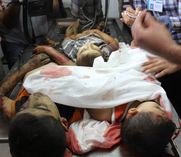
The Palestinian Ministry of Health in Gaza issued a report stating that Israeli missiles and shells, fired against the Palestinian population of Gaza since July 8, led to the death of 2145 Palestinians, including 578 children, 263 women, and 102 elderly.
It said around 11100, including 3374 children, 2088 women and 410 elderly, have been injured.
The Ministry said that the army targeted entire families in the coastal region, killing members of 100 families in Gaza, wiping out entire families.
The majority of Palestinians killed and injured by Israeli missiles and shells are civilians, including infants, children, teenagers, women and elderly, in addition to rescue operators, medics and journalists.
The Ministry stated that Israel deliberately targeted 15671 Palestinian homes, destroying and flattening 2276 homes, and causing partial damage to 13395 homes, rendering them uninhabitable, while thousands of homes sustained partial damage.
It added that Israeli missiles and shells have killed 23 medical workers, while 83 others have been injured.
In addition, Israeli missiles targeted 190 mosques in different parts of the Gaza Strip, flattening and destroying 70 mosques, while 120 sustained partial damage, the Ministry of Waqf and Religious Affairs said.
The Israeli army also fired missiles into 143 schools, including UNRWA-run schools, destroying 24 of them, the Ministry of Education said.
Dozens of residents have been killed and injured, during Israeli bombardment of schools where the residents sought shelter.
Around 500.000 Palestinians had to leave their homes, mostly because they were bombarded; many sought shelter in homes of relatives, in areas of lesser bombardment in the Gaza Strip, and more than 200.000 of them sought shelter in UNRWA and governmental schools.
It said around 11100, including 3374 children, 2088 women and 410 elderly, have been injured.
The Ministry said that the army targeted entire families in the coastal region, killing members of 100 families in Gaza, wiping out entire families.
The majority of Palestinians killed and injured by Israeli missiles and shells are civilians, including infants, children, teenagers, women and elderly, in addition to rescue operators, medics and journalists.
The Ministry stated that Israel deliberately targeted 15671 Palestinian homes, destroying and flattening 2276 homes, and causing partial damage to 13395 homes, rendering them uninhabitable, while thousands of homes sustained partial damage.
It added that Israeli missiles and shells have killed 23 medical workers, while 83 others have been injured.
In addition, Israeli missiles targeted 190 mosques in different parts of the Gaza Strip, flattening and destroying 70 mosques, while 120 sustained partial damage, the Ministry of Waqf and Religious Affairs said.
The Israeli army also fired missiles into 143 schools, including UNRWA-run schools, destroying 24 of them, the Ministry of Education said.
Dozens of residents have been killed and injured, during Israeli bombardment of schools where the residents sought shelter.
Around 500.000 Palestinians had to leave their homes, mostly because they were bombarded; many sought shelter in homes of relatives, in areas of lesser bombardment in the Gaza Strip, and more than 200.000 of them sought shelter in UNRWA and governmental schools.
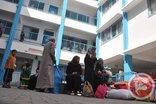
Displaced Gaza residents in sheltering centers are suffering from dangerous skin infections which could become a epidemic as a result of water shortage, the Ministry of Health says.
Speaking to Ma’an, the director of the chronic diseases department said about 50 percent of Gazans who live in sheltering centers suffer from skin problems such as fungal infections, scabies and lice.
The main reason for such infections, added Dr Kamal Shakhra, is the severe water shortage.
The Palestinian Ministry of Health has shipped truckloads of medicines for skin conditions from the West Bank to the Gaza Strip. In addition, a delegation of four dermatologists from the West Bank has been checking hundreds of people in the sheltering centers.
The severe water shortage and the fact that too many people sleep in small rooms helps spread the diseases quickly, so a dermatologist should be available in each sheltering center day and night, added Dr Shakhra.
For his part, Palestinian Minister of Health Jawad Awwad told Ma’an that his ministry contacted several international organizations and donors to try and provide medicines for all Gaza residents who were injured or those who suffered different infections during the war on Gaza.
The ministry is following up with the health situation in Gaza in cooperation with the World Health Organization, added Awwad.
Speaking to Ma’an, the director of the chronic diseases department said about 50 percent of Gazans who live in sheltering centers suffer from skin problems such as fungal infections, scabies and lice.
The main reason for such infections, added Dr Kamal Shakhra, is the severe water shortage.
The Palestinian Ministry of Health has shipped truckloads of medicines for skin conditions from the West Bank to the Gaza Strip. In addition, a delegation of four dermatologists from the West Bank has been checking hundreds of people in the sheltering centers.
The severe water shortage and the fact that too many people sleep in small rooms helps spread the diseases quickly, so a dermatologist should be available in each sheltering center day and night, added Dr Shakhra.
For his part, Palestinian Minister of Health Jawad Awwad told Ma’an that his ministry contacted several international organizations and donors to try and provide medicines for all Gaza residents who were injured or those who suffered different infections during the war on Gaza.
The ministry is following up with the health situation in Gaza in cooperation with the World Health Organization, added Awwad.
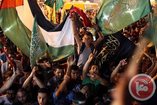
The skies over the Gaza Strip were calm Wednesday as a long-term ceasefire between Israel and the Palestinians took hold after 50 days of the deadliest violence in a decade.
Millions in and around the war-torn enclave enjoyed a welcome night of peace during which there were no strikes on Gaza, nor Palestinian rockets fired at Israel, the Israeli army said.
"Since the truce came into force, there has been no IDF activity in Gaza, and no rocket fire on Israel," a military spokeswoman said 12 hours after the guns on both sides fell silent.
In Gaza, where celebrations erupted once the truce took hold on Tuesday, the festivities continued late into the night as its 1.8 million residents reveled in the end of seven weeks of bloody violence.
The conflict, which began on July 8 when Israel began Operation Protective Edge in a bid to stamp out cross-border rocket fire, has claimed the lives of 2,143 Palestinians and 70 on the Israeli side.
UN figures show nearly 70 percent of the Palestinian victims were civilians, while 64 of the Israelis killed were soldiers.
The Palestinians said it was a "permanent" truce, while a senior Israeli official described it as "unconditional and unlimited in time."
Washington gave its full backing to the Egyptian-mediated deal, with US Secretary of State John Kerry calling on both sides "to fully and completely comply with its terms.
"We strongly support today's ceasefire agreement," he said early Wednesday, while UN Secretary General Ban Ki-moon voiced hope that the ceasefire in Gaza would set the stage for talks on a final Israeli-Palestinian peace deal.
Britain also welcomed the truce, hailing Egyptian efforts to end the violence.
"The ceasefire provides a critical and welcome window of opportunity for reaching a comprehensive agreement that tackles the underlying causes of the conflict," said Tobias Ellwood, Britain's Minister for the Middle East.
And Tony Blair, envoy for the Middle East Quartet of diplomatic peacemakers, also welcomed the end of the bloodshed.
"The Quartet will now concentrate on a long-term plan for Gaza and for its reconstruction, including the effective and efficient re-opening and re-connection (of the enclave) to the outside world under the authority of the Palestinian Authority government," he said in a statement.
"Such a plan will enable a proper and decent life for the people of Gaza, as well as protect the security of the people of Israel."
'Can't believe I'm still alive'
In Gaza itself thousands flooded onto the streets in celebration, some firing joyfully into the air, among them gunmen from Hamas, AFP correspondents said.
Chanting and clapping, they surged through the battered streets, bellowing songs of victory as a man swathed in a huge green Hamas flag threw handfuls of sweets into the air.
"Thank God the war is ended. I can't believe I'm still alive with my kids!" 32-year-old Maha Khaled said.
"It was a very harsh war. I never thought that we would see peace at the end."
Cars jammed the streets, their horns honking incessantly, as beaming women and children flashed victory signs and crowds of young men bounced up and down on rooftops, waving flags.
As night fell, there was no letup in the celebrations as the rhythmic thud of drums beat a celebratory pulse and a performer breathed fire to entertain the ecstatic crowd.
"Today Gaza showed the world that it is resisting and that it is stronger than Israel," said Tamer al-Madqa, 23.
'Ending the blockade'
News of the agreement first emerged from the West Bank city of Ramallah where a Palestinian official said that an elusive "permanent ceasefire" deal would involve an end to Israel's eight-year blockade of Gaza.
Ending the blockade had been a key Palestinian demand in truce talks, with Hamas hailing the agreement as a "victory for the resistance."
"The Egyptian initiative (includes) an opening of the crossings for goods and humanitarian and food aid to enter Gaza, as well as medical supplies and materials to repair the water, electricity and mobile phone networks," chief Palestinian truce negotiator Azzam al-Ahmed told AFP.
Restrictions on fishing would end "immediately" with boats allowed to fish up to six miles offshore with the limit later extended to 12 miles, he said.
There was no immediate word on when the crossings would be opened under terms outlined in the deal, or whether the fishing zone extension was in place.
At a later, unspecified date, the two sides would return to Cairo to discuss "the exchange of (Palestinian) prisoners and of the bodies of those (Israeli soldiers) killed" during the conflict, Ahmed said.
Egypt's foreign ministry confirmed there would be a "continuation of indirect negotiations between the two sides on other matters within one month of the ceasefire taking effect."
A senior Israeli official said the talks would resume in Cairo "within a month," saying its delegation would be "raising our concerns about demilitarization and preventing Hamas from rearming."
But in his first public appearance since the start of the war, senior Hamas official Mahmoud al-Zahar, who like other Hamas and Islamic Jihad leaders had gone to ground to avoid being assassinated by Israel, pledged its military wing would continue "arming itself and developing its resistance capacity."
Millions in and around the war-torn enclave enjoyed a welcome night of peace during which there were no strikes on Gaza, nor Palestinian rockets fired at Israel, the Israeli army said.
"Since the truce came into force, there has been no IDF activity in Gaza, and no rocket fire on Israel," a military spokeswoman said 12 hours after the guns on both sides fell silent.
In Gaza, where celebrations erupted once the truce took hold on Tuesday, the festivities continued late into the night as its 1.8 million residents reveled in the end of seven weeks of bloody violence.
The conflict, which began on July 8 when Israel began Operation Protective Edge in a bid to stamp out cross-border rocket fire, has claimed the lives of 2,143 Palestinians and 70 on the Israeli side.
UN figures show nearly 70 percent of the Palestinian victims were civilians, while 64 of the Israelis killed were soldiers.
The Palestinians said it was a "permanent" truce, while a senior Israeli official described it as "unconditional and unlimited in time."
Washington gave its full backing to the Egyptian-mediated deal, with US Secretary of State John Kerry calling on both sides "to fully and completely comply with its terms.
"We strongly support today's ceasefire agreement," he said early Wednesday, while UN Secretary General Ban Ki-moon voiced hope that the ceasefire in Gaza would set the stage for talks on a final Israeli-Palestinian peace deal.
Britain also welcomed the truce, hailing Egyptian efforts to end the violence.
"The ceasefire provides a critical and welcome window of opportunity for reaching a comprehensive agreement that tackles the underlying causes of the conflict," said Tobias Ellwood, Britain's Minister for the Middle East.
And Tony Blair, envoy for the Middle East Quartet of diplomatic peacemakers, also welcomed the end of the bloodshed.
"The Quartet will now concentrate on a long-term plan for Gaza and for its reconstruction, including the effective and efficient re-opening and re-connection (of the enclave) to the outside world under the authority of the Palestinian Authority government," he said in a statement.
"Such a plan will enable a proper and decent life for the people of Gaza, as well as protect the security of the people of Israel."
'Can't believe I'm still alive'
In Gaza itself thousands flooded onto the streets in celebration, some firing joyfully into the air, among them gunmen from Hamas, AFP correspondents said.
Chanting and clapping, they surged through the battered streets, bellowing songs of victory as a man swathed in a huge green Hamas flag threw handfuls of sweets into the air.
"Thank God the war is ended. I can't believe I'm still alive with my kids!" 32-year-old Maha Khaled said.
"It was a very harsh war. I never thought that we would see peace at the end."
Cars jammed the streets, their horns honking incessantly, as beaming women and children flashed victory signs and crowds of young men bounced up and down on rooftops, waving flags.
As night fell, there was no letup in the celebrations as the rhythmic thud of drums beat a celebratory pulse and a performer breathed fire to entertain the ecstatic crowd.
"Today Gaza showed the world that it is resisting and that it is stronger than Israel," said Tamer al-Madqa, 23.
'Ending the blockade'
News of the agreement first emerged from the West Bank city of Ramallah where a Palestinian official said that an elusive "permanent ceasefire" deal would involve an end to Israel's eight-year blockade of Gaza.
Ending the blockade had been a key Palestinian demand in truce talks, with Hamas hailing the agreement as a "victory for the resistance."
"The Egyptian initiative (includes) an opening of the crossings for goods and humanitarian and food aid to enter Gaza, as well as medical supplies and materials to repair the water, electricity and mobile phone networks," chief Palestinian truce negotiator Azzam al-Ahmed told AFP.
Restrictions on fishing would end "immediately" with boats allowed to fish up to six miles offshore with the limit later extended to 12 miles, he said.
There was no immediate word on when the crossings would be opened under terms outlined in the deal, or whether the fishing zone extension was in place.
At a later, unspecified date, the two sides would return to Cairo to discuss "the exchange of (Palestinian) prisoners and of the bodies of those (Israeli soldiers) killed" during the conflict, Ahmed said.
Egypt's foreign ministry confirmed there would be a "continuation of indirect negotiations between the two sides on other matters within one month of the ceasefire taking effect."
A senior Israeli official said the talks would resume in Cairo "within a month," saying its delegation would be "raising our concerns about demilitarization and preventing Hamas from rearming."
But in his first public appearance since the start of the war, senior Hamas official Mahmoud al-Zahar, who like other Hamas and Islamic Jihad leaders had gone to ground to avoid being assassinated by Israel, pledged its military wing would continue "arming itself and developing its resistance capacity."
Page: 127 - 126 - 125 - 124 - 123 - 122 - 121 - 120 - 119 - 118 - 117 - 116 - 115 - 114 - 113 - 112 - 111
Truce violations List of names Pictures of martyrs
Days: Aug: 26 - 25 - 24 - 23 - 22 - 21 - 20 - 19 - 18 - 17 - 16 - 15 - 14 - 13 - 12 - 11 - 10 - 9 - 8 - 7 - 6 - 5 - 4 - 3 - 2 - 1
July: 31 - 30 - 29 - 28 - 27 - 26 - 25 - 24 - 23 - 22 - 21 - 20 - 19 - 18 - 17 - 16 - 15 - 14 - 13 - 12 - 11 - 10 - 9 - 8
Days: Aug: 26 - 25 - 24 - 23 - 22 - 21 - 20 - 19 - 18 - 17 - 16 - 15 - 14 - 13 - 12 - 11 - 10 - 9 - 8 - 7 - 6 - 5 - 4 - 3 - 2 - 1
July: 31 - 30 - 29 - 28 - 27 - 26 - 25 - 24 - 23 - 22 - 21 - 20 - 19 - 18 - 17 - 16 - 15 - 14 - 13 - 12 - 11 - 10 - 9 - 8
